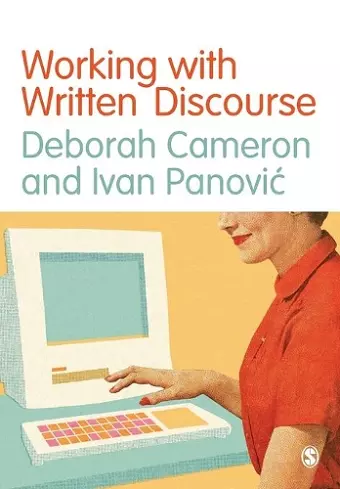Working with Written Discourse
Ivan Panovic author Deborah Cameron author
Format:Paperback
Publisher:Sage Publications Ltd
Published:10th Mar '14
Should be back in stock very soon
This paperback is available in another edition too:
- Hardback£132.00(9781446267226)

An outstanding introduction to discourse analysis of written language in an age that is more and more characterized by multilingual, digital, and generically hybrid texts. In an accessible style, Working with Written Discourse illustrates how these texts can be analyzed employing a wide variety of approaches that are critical, multidisciplinary, and productive.
- Professor Jaffer Sheyholislami, Carleton University
"Comprehensive and up-to-the-minute in its discussion of areas like multimodality and the new media, without overlooking ‘older’ media and more conventional writing. I will recommend it highly to students at all levels."
- Dr Mark Sebba, Lancaster University
Addressing the practicalities of research, and embracing the complexity and variety of written forms of language, this book:
- grounds readers in a broad range of concepts, debates and relevant methods
- focuses on both theoretical questions and the ‘how to’ of analysis
- is loaded with practical activities and advice on the design and execution of research
- highlights computer-mediated communication and new media discourse, from text messages and tweets to mobile phone novels and online encyclopedias
- draws on data from international and multilingual communities.
The perfect companion to Deborah Cameron′s best-selling Working with Spoken Discourse, this book equips readers with practical and conceptual tools to ask questions about written discourse, and to analyse the huge variety of texts that make up our linguistic landscape. It is the essential guide for students of discourse analysis in linguistics, media and communication studies, and for social researchers across the social sciences.
Working with Written Discourse in three words: erudite, elegant, engaging. Grounded in an extensive, up-to-date literature, Cameron and Panovic provide here a beautifully and sensibly organized introduction to the field. With constant opportunities for further reflection and discussion, the book is also chock-a-block with contemporary examples and fresh ideas for hands-on practice. I would – no, I will – use this book as a core text in my graduate seminars as readily as I will my undergraduate courses. Cameron’s Working with Spoken Discourse has been a key text in my classes for over a decade; my only (quite unreasonable) gripe being that it didn’t offer me enough on things like new media discourse and multimodal discourse. Well, here we have it: a perfect complement. And much more besides. -- Professor Crispin Thurlow
This volume is written in an admirably clear and understandable style, without compromising on the depth of the arguments and discussions. It is comprehensive and up-to-the-minute in its discussion of areas like multimodality and the new media, without overlooking ‘older’ media and more conventional writing. I will recommend it highly to students at all levels.
-- Dr Mark Sebba
This is an outstanding introduction to discourse analysis of written language in an age that is more and more characterized by multilingual, digital, and generically hybrid texts. In an accessible style, Working with Written Discourse illustrates how these texts can be analyzed employing a wide variety of approaches that are critical, multidisciplinary, and productive. -- Professor Jaffer Sheyholislami
Working with Written Discourse is an engaging read on current theoretical and methodological approaches to the analysis of written discourse. The book enjoys a number of distinctive features compared to parallel publications. First... this book provides a thorough introduction to common underpinning concepts and current literature on written discourse and its analysis. Second, it presents an interesting array of examples, activities and further readings to initiate the reader to a hands-on experience in written discourse analysis. Third, looking beyond conventional textual and formalistic aspects of written discourse, it highlights the role of socio-political and cultural variables and contexts in shaping and transforming written discourse as well as its analysis. Most importantly, it is one of the pro-technology publications on written discourse analysis ,as a big portion of it is dedicated to technology-mediated discourse and technology facilitated discourse analysis. The image on the front cover is a subtle gesture in this respect. -- Pejman Habibie, Faculty of Education, The University of Western Ontario, Cananda
ISBN: 9781446267233
Dimensions: unknown
Weight: 380g
216 pages